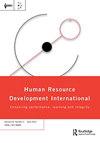韩国的社会距离和职场关系:探索在COVID-19之前和期间工作中消极和积极情感交流的变化
IF 3.9
Q2 MANAGEMENT
引用次数: 0
摘要
许多组织引入了社交距离来遏制COVID-19大流行。然而,由于社交距离旨在减少个人互动,它可能会影响职场关系。本文探讨了社交距离如何以及何时影响职场关系。根据社会交换的情感理论和社会认知文献,我们认为当员工与同事之间的负面情感关系较多时(在新冠肺炎之前),社交距离有助于改善这种负面情感关系(在新冠肺炎期间),尤其是当同事是热情和有能力的时候。我们收集了韩国个别员工在COVID-19之前和期间与同事的关系数据。我们的分层线性模型结果表明,当员工被视为热情和有能力的同事时,社交距离确实会减少员工与同事之间的负面情感关系。相反,社交距离不会损害员工的积极情感关系。这些研究结果表明,与社交距离和远程工作导致误解和冲突的观点相反,社交距离有助于改善员工的职场关系。因此,我们为人力资源开发专业人员提供了在远程环境中促进高质量关系的启示。本文章由计算机程序翻译,如有差异,请以英文原文为准。
Social distancing and workplace relationships in South Korea: exploring changes in negative and positive affective exchanges at work before and during COVID-19
Many organisations introduced social distancing to curb the COVID-19 pandemic. However, since social distancing is designed to reduce personal interactions, it can impact workplace relationships. This paper explores how and when social distancing influences workplace relationships. Drawing on the affect theory of social exchange and the social cognition literature, we argue that when employees have more negative affective relationships with their co-workers (before COVID-19), social distancing helps improve such negative affective relationships (during COVID-19), especially when the co-worker is warm and competent. We collected data on relationships that individual employees in South Korea have with their co-workers before and during COVID-19. Our hierarchical linear modelling results show that social distancing indeed reduces the negative affective relationships that employees have with their co-workers when those co-workers are viewed as warm and competent. Conversely, social distancing does not hurt employees' positive affective relationships. These findings suggest that contrary to view that social distancing and remote work causes misunderstanding and conflict, social distancing helps to improve employees' workplace relationships. We therefore draw implications for human resource development professionals in facilitating high-quality relationships in remote settings.
求助全文
通过发布文献求助,成功后即可免费获取论文全文。
去求助
来源期刊

HUMAN RESOURCE DEVELOPMENT INTERNATIONAL
MANAGEMENT-
CiteScore
11.40
自引率
11.10%
发文量
43
期刊介绍:
Human Resource Development International promotes all aspects of practice and research that explore issues of individual, group and organisational learning and performance. In adopting this perspective Human Resource Development International is committed to questioning the divide between practice and theory; between the practitioner and the academic; and between traditional and experimental methodological approaches. Human Resource Development International is committed to a wide understanding of ''organisation'' - one that extends through self-managed teams, voluntary work, or family businesses to global enterprises and bureaucracies. Human Resource Development International also commits itself to exploring the development of organisations and the life-long learning of people and their collectivity (organisation), their strategy and their policy, from all parts of the world. In this way Human Resource Development International will become a leading forum for debate and exploration of the interdisciplinary field of human resource development.
 求助内容:
求助内容: 应助结果提醒方式:
应助结果提醒方式:


